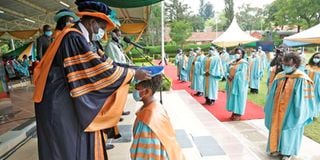PhDs shouldn’t be upset if we don't bestow on them the title ‘Dr’

Maseno Univerity board member Edwins Mukabana confers a degree to a PhD graduand during Maseno University’s 20th graduation ceremony on April 30.
What you need to know:
- In general, there are many good reasons for conferring the title “Dr” on those with PhDs.
- It’s a way of giving more information about the persons or their activities.
It was not even his own doctorate at stake, but he was emphatic. “Under whatever circumstances this error was made, it should be corrected with a public apology,” demanded Njue Manyatta. “The (Teachers Service Commission) chairman is an academic doctor complete with a well-earned PhD, one of the less than 10,000 holders of the qualification among more than 50 million Kenyans.”
Dr Manyatta was upset that the Daily Nation referred to Jamleck Muturi as “Mr” instead of “Dr” in a news story headlined “TSC emerges victorious in pay dispute with teachers”, published on July 14, 2021. The offending paragraph reads: “Union leaders on Tuesday met TSC officials led by the chair, Mr Jamleck Muturi, and chief executive Nancy Macharia, the culmination of behind-the-scenes lobbying ever since talks collapsed two weeks ago.”
In general, there are many good reasons for conferring the title “Dr” on those with PhDs. It’s a way of giving more information about the persons or their activities. It also bestows on them deserved honour, recognition, respect and admiration. If a teacher, it helps one to gain respect from students. It signifies one has expertise in a certain subject .
However, conferring the title on those who don’t practise medicine, without giving the necessary context, could be confusing or misleading because the public, in general, thinks a “doctor” is a medical doctor.
Such confusion was, in a way, brought home in one of Kenya’s most watched and acrimonious elections. The powerful Foreign Affairs minister, Dr Njoroge Mungai, who was MP for Dagoretti and reportedly the private doctor for President Jomo Kenyatta, was challenged by a newcomer, Dr Johnstone Muthiora, in what became a famous duel for two doctors in the 1974 General Election.
Dr Muthiora had a Doctor of Philosophy (PhD) doctorate degree from India and at political rallies he would explain he was “Daktari wa ubongo” (‘brain doctor’) while Dr Mungai was “Daktari wa vidonda” (‘wounds doctor’). “Daktari wa ubongo”, naturally, won the election in a landslide.
Context of the story
There’s a constant debate over whether journalists should use the title “doctor” for everyone with a PhD. The “AP Style Guide”, considered the bible of newswriting, says the title should only be used for non-medical doctoral degree holders if appropriate in the context of the story. The reason is because the public frequently identifies “Dr” only with medical doctors. In Kenya, the media bestows the title on anyone who has a medical degree or a PhD, regardless of the context.
I didn’t, however, take up Dr Manyata’s complaint with the Nation editor because of four reasons. First, there’s no requirement in journalism or NMG editorial policy that the newspaper should use the title for PhD holders in news stories. Secondly, Dr Manyatta, who teaches education psychology at the Catholic University of East Africa, didn’t have standing. There was no evidence that he was acting on behalf of the TSC chairman.
Not all PhD holders are miffed if they’re not addressed as “Dr”. Some even find the honorific unnecessary and off-putting. This was the case with an old colleague and departed friend, Prof Alfred Opubor.
The Nigerian scholar was the first man in Africa to get a PhD in communication and, for four decades, he shaped the way communication was taught in the continent. But in meetings he would introduce himself simply as “I’m Alfred Opubor” while other academics would be at pains to introduce themselves as “I’m Prof so-and-so, Dr so-and-so”.
One reason for not insisting on academic honorifics on every possible occasion is humility. Those who insist set themselves apart as self-glorifiers, aloof and snobby.
Thirdly, although the TSC chairman could have been accorded his academic honorific, there’s no error in the paragraph complained of that merits a correction. The missing honorific is not essential or relevant to the story.
Finally, for Dr Manyatta to demand that the Nation apologise publicly for failing to confer the honorific is petty and irrelevant.
The Public Editor is an independent news ombudsman who handles readers’ complaints on editorial matters including accuracy and journalistic standards. Email: [email protected]. Call or text 0721989264.





